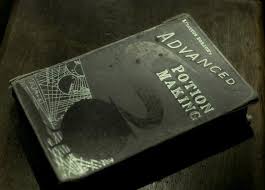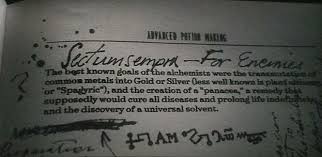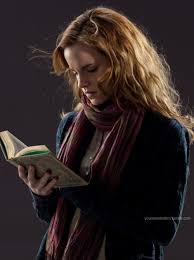Someone who is very knowledgeable, especially a college professor, is likely to be portrayed with a book about a favorite subject. Those who know a lot about several different topics is said to be "well-versed" (which I am assuming comes from a time before books, when bards would sing verses) or "well-read." Those who have an even more advanced knowledge that is mysterious or even mystical are also typically portrayed with a book, a book of spells.
If

we see a depiction of Merlin, who lived before printed text existed, he would likely still have a book- and a rather large book at that. In addition to being highly expensive because of its size, such a book is worth even more because of the knowledge it contains. Clergymen, one of the most powerful class in the middle ages, always had another rather large book with them: the Bible, which although not a book of spells does have some similarities to one because of the super-human elements in both. Books have long been associated with both knowledge and power. But how does this concept change when books go from being hand-written to being printed?
To answer this question, I am going to do something incredibly post-medieval and post-Renaissance. I'm going to talk about our newest celebrity...

What, you didn't think I meant Harry Potter, did you? Snape definitely trumps Harry any day. And if you thought I meant Justin Bieber, you're out of your mind! (We're not going THAT post-medieval.) Anyway, as I am going to assume you all know (if you don't know, I will be stupefied), in
Harry Potter an d The Half-Blood Prince
d The Half-Blood Prince, Harry winds up with an old copy of
Advanced Potion Making for his NEWT potions class taught by Professor Horace Slughorn. Harry soon finds that this particular copy of his textbook is not entirely the same as those purchased at Flourish and Blotts. It has been written in by a mysterious persona who calls himself the Half-Blood Prince (
SPOILERS: It's Snape. Oh, and Snape kills Dumbledore. Oh, and he loved Harry's mom his whole life. Yeah, now Snape killing Dumbledore doesn't seem like that big a spoiler, does it?)
So anyway, while Harry's classmates all get the standard run-of-the-paper-mill
Advanced Potion Making, Harry gets Snape's old text with notes in the margins about potion making and other magic, including several spells that Snape himself invented. Harry's copy is significantly more valuable as it instructs him on how to obtain better results in his potion-making, making him perform even better than Hermione at the subject. Snape's old book also contains the incantations for several of the most powerful spells we ever see in the Harry Potter universe. Thus we have Harry's copy with Snape's notes, which could symbolize written text because of Snape's personal, hand-written notes, and the "normal" copy, which is significantly less useful and less powerful and could symbolize the print text.

Of course, this is not to say that the other books are useless. None of

Hermione's textbooks have hand-written notes by professors in the margins, but she still makes great use out of them (certainly more than Harry and Ron put together). In fact, these books are so important that when the trio is packing for their extended camping trip in the next book, Hermione packs more books than anything else (and becomes quite upset when they fall over after being alphabetized.) In this sense, it is almost as if Rowling is trying to say that printed text is useful and powerful but that written text is even more so. In a muggle sense, it's kind of like the difference in the meaning of receiving an e-card with a famous painting on it and receiving a famous painting.
Rowling therefore establishes an idea of written t

ext being superior to print text in
The Half-Blood Prince, and she carries this idea over into
The Deathly Hallows. When Dumbledore has died, he leaves Hermione (who he knows is going to be the one who is going to be doing the thinking) with his personal copy of
The Tales of Beedle the Bard (which in addition to the written tradition as discussed above in relation to Snape's
Advanced Potion Making could also represent an oral tradition, but that's taking us down a whole nother alley). In this specific copy, Dumbledore has inked in an image above one of the stories: the sign of the Deathly Hallows. Hermione, who is extremely familiar with print texts, recognizes this addition immediately. Without it, the trio would not have been able to learn the secret of the Elder Wand, which allowed Harry to defeat Voldemort in their final (sadly anticlimactic) duel.

We therefore have
the most celebrated writer of this millennium writing in what she knows will end up being a print medium (and what she knows will be the best selling book, possibly even best selling *thing* of the decade, the final installment of her entire series) about how the written medium is superior to the print! Talk about being stupefied! So if we, in our digital age, can look back at a pre-Renaissance medium/form of knowledge/style and see how it was, in many ways, superior to the form that followed, what must others in the fifteenth century (monarchies, the Catholic church, Protestant Reformers, guilds, universities, and even common people) have thought about this new medium that we today so frequently cite as the single invention that began the modern era? Just think about it. Use a pensieve, that may help.
Interesting post. I agree that written knowledge is, in many aspects, superior to printed. Thus professors allow hand written notes on exams, while disallowing textbooks. In an attempt to argue the opposite side of your assertion (namely, that printed texts have more value than written ones in some circles), I came across an interesting thought. Most books that I would place high value on, in the printed form, are collections of information and tables of data. If you can copy something exactly, then you are able to keep data that takes a long time to create. The interesting part is that as computers get faster, more and more of this sort of data is becoming computable on demand. For this reason, collations of data are becoming outdated in some senses. This, compared with the immortal value of personal thought processes scribbled down at conception, seems to further strengthen your praise of the written medium.
ReplyDeleteI loved the post, especially because I love anything Harry Potter. So there. But I do disagree with your assertion that JK Rowling believes written is better than printed. Simply put, the usefulness of knowledge has absolutely nothing to do with the medium. Oral, written, folk, print...whatever. Certainly certain knowledge is more helpful, useful, or instructive to a particular individual, but that knowledge can be transferred in a variety of ways. For instance: What if Snape had gotten permission to re-write the advanced potions making book? Now, suddenly, all of Snape's knowledge is in print form, not written, and yet it is still entirely beneficial. Maybe I'm missing your point, but I hope you see mine.
ReplyDelete*Certainly certain....yikes. That was some poor word choice.
ReplyDeleteI love this post too and how you creatively bring up the subject of annotations. Great work! Alex, because of standardization and the obvious risk that unknown or untested spells could have it would never be published. Thus it has less of am impact than the book. However, because it contains an individual's thoughts, ideas, innovations, etc, whoever has a copy of that annotated book will have the advantage over the others. Assuming the notes are from a genius in his field, like Snape and potions. If you don't have the opportunity to print or want to print, but still are okay with someone potentially finding it, writing in a book is a good idea.
ReplyDeleteI agree that having access to spells and potion making processes that no one else knows is a huge advantage...all I'm saying is that it doesn't matter what form that knowledge takes, only that it is restricted to Harry/Snape. Snape could have (this would never happen), but snape could pull Harry into his office and orally transmit this knowledge much like a tutor or a mentor would. Or, snape could have one copy of his book printed and given to Harry as a gift for christmas (once again, this would never happen).
ReplyDeleteBrianne I understand your argument, and even agree with it. I just think that in this specific case, you can't argue that one medium is more important than another when the same knowledge could have been transmitted in multiple ways. However, the restriction of the knowledge, that is what ends up being important.
Offered without further comment:
ReplyDeletehttp://news.bbc.co.uk/2/hi/entertainment/7142656.stm